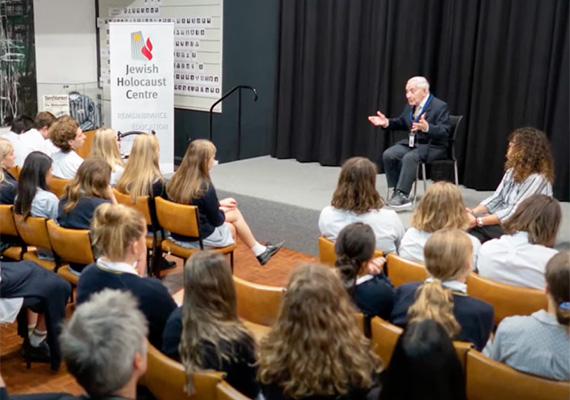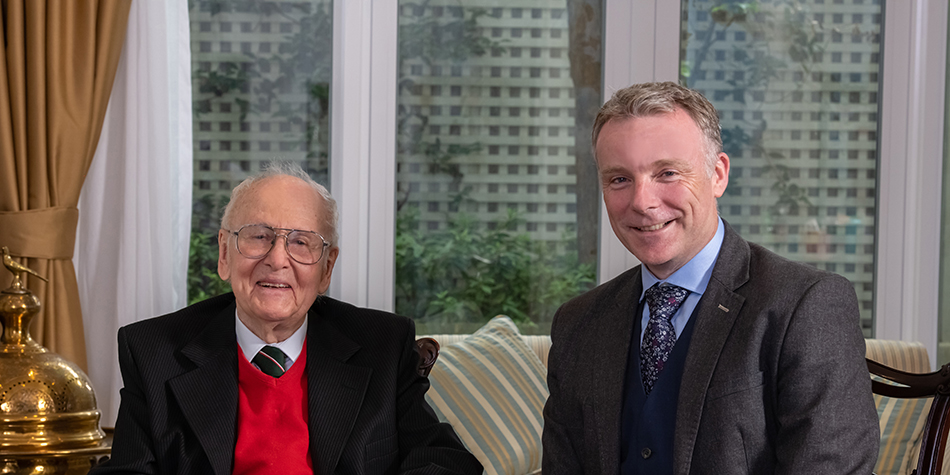When one thinks of the Holocaust, it might not immediately be considered as an Australian story.
And yet the impact of the atrocities has become embedded in our nation’s history through the survivors who escaped to our shores. In fact, it’s estimated that the Jewish community in Australia tripled from European migration following the Second World War.
Recognising that national connection, Deakin researchers have recently partnered with the Gandel Foundation on a groundbreaking study to discover the Australian public’s actual knowledge and awareness of the Holocaust.
In fact, the Gandel Holocaust Knowledge and Awareness in Australia Survey (GHKAS) is the largest study of its kind conducted anywhere in the world. The research was undertaken by Associate Professor Steven Cooke, Dr Donna-Lee Frieze, Professor Andrew Singleton and Dr Matteo Vergani.
'In Australia, often we think that the Holocaust is something that happened very far away and an increasingly long time ago, but what's really interesting and important about the Australian context is how many connections there are and how the Holocaust is truly part of the Australian story too,' Associate Professor Steven Cooke says.
One of those connections is Deakin’s very first Vice-Chancellor, the late Emeritus Professor Fred Jevons AO. The Brookes Cultural Heritage Scholarship celebrates his story.
The results of the survey shine a light on positive contributions, but also some uncomfortable truths. 'And of course, that's really important to talk about, but it's also really important to talk about and understand the more difficult histories, including restrictive immigration policies and the war criminals who came to Australia after the war as well,' Associate Professor Cooke says.
We tend to think about Australia's relationship to the Holocaust as something that's quite heroic; it's quite a positive story in terms of the reception of survivors post-war.
Associate Professor Steven Cooke
Cultural heritage and museum studies
Survivors have told of unfathomable inhumanity and they also inspired theirs with their courage and resilience. With the end of the Holocaust now 77 years ago, the time is fast approaching when that generation’s voice will fall silent.
'How we, as a society, engage with their testimony and their memories after they're no longer with us to give the benefit of face-to-face engagement and the power of that testimony is really key,' Dr Donna-Lee Frieze says.
The Gandel Holocaust Study’s findings, released earlier this year on International Holocaust Remembrance Day (January 27), provide important insight into the effectiveness of education as a tool to prevent racial intolerance and prejudice in the face of rising racism, antisemitism and extremism here and abroad.
One startling finding of the survey is that one in four Australians have little to no knowledge of the Holocaust.
'This is such a crucial time for this kind of survey and having a snapshot of where Australia is today, as we're seeing an increase in online Holocaust denial and distortion, as well as antisemitic conspiracy theories,' Dr Vergani says.
By identifying gaps and strengths in existing knowledge, and sharing that information with the public, all levels of government and key policy-makers, better methods, programs and public policies can be developed.
Professor Singleton says the size of the respondent group – nearly 3500 people – achieves the 'gold standard' for quantitative research.
'That gives us a real advantage in terms of being able to drill down into the demographic data and compare different groups in the population. Because of the investment and the support of the Gandel Foundation, we'll be able to make very robust claims about the strength and generalisability of the data,' Professor Andrew Singleton says.
At the same time, there's a lot of emphasis and funding from federal, state and local governments and philanthropy on Holocaust education. By the end of 2024, there are going to be Holocaust centres or museums in every state and territory.
Dr Matteo Vergani
Senior Research Fellow, Alfred Deakin Institute for Citizenship and Globalisation, Senior lecturer in sociology
Since 1978, the Gandel Foundation has invested more than $150 million in a broad array of charities and causes. It considers preserving the memory of the Holocaust and the lessons it holds for humanity to be imperative.
Its Holocaust education and remembrance initiatives include the award-winning Gandel Holocaust Studies Program for Australian Educators (GHSP) at Yad Vashem. This program has trained more than 350 educators who reach tens of thousands of students every year in each state and territory, helping them learn about and understand a bit more of the story of the Holocaust.
Gandel Foundation’s Holocaust funding supports exhibitions, institutions, programs, advocacy and knowledge sharing, all of which is servicing this awareness and recognition.
The GHKAS findings could have significant implications on the national curriculum and inform how we as a nation think about and deal with antisemitism racism.
Associate Professor Cooke says the GHKASA will have immense longitudinal benefit.
'Once this investment starts to flow through, we'll be in a position in five- or ten-years’ time to repeat the study, to think about what impact this emphasis on Holocaust education is having.'
A quarter of Australians know little or nothing about the Holocaust
A key objective of the survey was to understand not just how much Australians know factually about the Holocaust, but also how aware they are of the catastrophe and its enduring impact and lessons it holds. Learn more about the key findings and recommendations.

The Brookes Cultural Heritage Scholarship
This unique PhD scholarship is made possible due to the generosity of the late Mr Roger Brookes. It supports new research that examines the diverse and lasting contributions of Jewish émigrés who came to Australia fleeing Nazi persecution.
As a child, Emeritus Professor Fred Jevons fled from Vienna to the United Kingdom on the Kindertransport network. His only possession was a violin. He eventually earned admission to Cambridge University and worked at the University of Manchester before relocating to Australia to help found Deakin University.
Mr Brookes discovered that his own father was connected to Professor Jevons and was inspired to leave a substantial gift in honour of Professor Jevons’ life and work.
The supported research will be undertaken by PhD student Evangeline Jarman and will examine new ways of interpreting the significant impact made on Australian life in a range of fields, including art and design, architecture, industry, politics and education in museum exhibitions.
Interested in finding out more?
Deakin welcomes contributions from those who wish to ensure this incredible body of research is supported well into the future. Call our team on +61 3 9244 5150 or email us to chat about how you can support.

